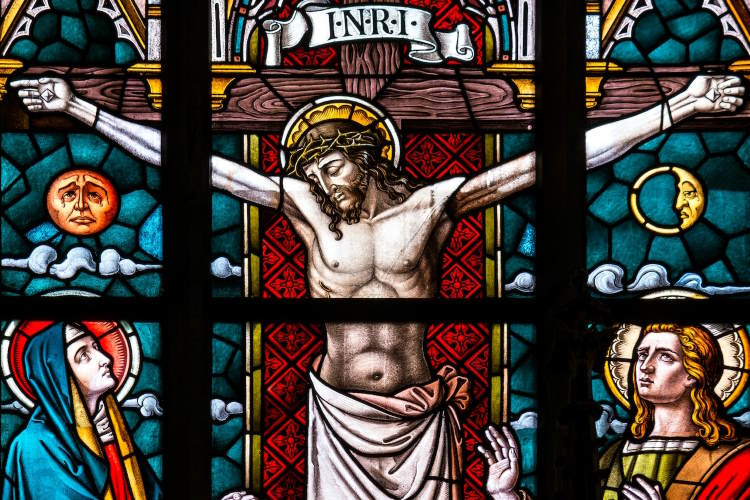Opinion column

Does our description of God need to change?
Regular contributor James Knight defends our traditional bible translations in which God is male, and questions the need to use gender-neutral terminology when referring to Him.
You've probably heard the recent bit of news that the Church of England is considering gender-neutral terms for God because He 'is neither male nor female': Personally, I think this is an absurd misjudgement - and if the church continues to cede more and more of its uniqueness, and keeps fading into the background of an increasingly theologically watered down modern culture, it may in the long run not have many pearls left to share.
This whole gender-neutral language when referring to God is no doubt on the back of a socio-cultural trend towards “accepting difference of all varieties”. But it does not necessarily mean that this naturally translates into a good basis for engaging with the Divine - after all, we know from Jesus that things that apply to earthly humans do not necessarily extend to applying to God ('My kingdom is not of this world').
The church is claimed to be something over and above human construction (although it is full of human construction too) - it is thought to be a body that represents the bride to Christ’s bridegroom. Hence, in those terms, even at a metaphorical level, sex is important; particularly as Jesus instructs us to pray to Our Father. Obviously there is no doubting Jesus' maleness - in becoming a man He took on all the properties of manhood (even sin right at the end on the cross), and there is no difficulty whatsoever in referring to Jesus in the masculine third person pronoun 'Him'.
But why did God the Father refer to Himself in terms of maleness? Is it perhaps the case that being (I presume) something spiritually beyond our comprehension, He may have identified Himself in terms of maleness in recognition of our difficulty in conceiving a neuter singular indefinite personal pronoun that departs from the ‘He’ or ‘She’ concepts (I don’t think we would wish to refer to God as ‘it’ - and both male and female being made in His image indicates Divine transcending of sex).
But that doesn't satisfy much, and I'll try to explain why. If God is transcendent of sex, and we can call God 'Him' or 'The Father', can we equally well call God 'Her' or 'The Mother'? I think you'd be hard pressed to find even a feminist Christian who would say this is not a problem. Similarly, to say that sex has zero importance must be to admit that God could have equally well chosen the Incarnation to be in the form of a woman instead of the male Jesus. Instead of Jesus on the cross as the Son of God, imagine a women on the cross as the Daughter of God - I don’t think many Christians would think that is the same religion. It would probably more closely resemble the worshipping of Aphrodite or Iris or Athena, which may have qualities that Christianity does not, but it wouldn’t be Christianity at all as we know it.
If the majority of Christianity's leading figures are seeking to retain the status of God as Father, and Christ as Son, as central tenets of the faith, I think we would be hard pressed to deny that this is entirely consistent with scripture. And I can equally see why if Christianity departs from God as Father and Christ as Son it could easily lose other core elements that make up its very essence.
With Christ at the head (bridegroom) of the church, we are dealing with ‘male’ and ‘female’ not merely as facts of nature but as shadows of deeper dimensional realities utterly beyond our control and largely beyond our direct knowledge. Given the foregoing, it is not that we have chosen that God should be Him not Her, it is more likely that it was chosen for us by God – and that to consider the church only as an analogue to, or as having qualitative importance with, the other socio-political institutions in the world is to diminish some of its power and gravitas.
And just as in his epistles St Paul often seems to be giving exhortations regarding the severity of the message of grace being impeded or disfigured by cult practices (the example of the instruction against women speaking in church in the letter to the Corinthians is not a universal edict to be taken doctrinally, but specifically as a portent against the Aphrodite cult, which was rife with prostitution, and priestesses immersed in the Christian church who were indulging in their own brand of heterodoxy and heresy), I suspect that the notion of God as Father and Christ as Son is central to the creation story in ways that none of us yet understand except perhaps in terms of creation as a shy adjunct of God's relationship with His creation.
I may be over-interpreting things here, but when scripture refers to Christ as our bridegroom, and Jehovah as our Father and Husband, perhaps this is to set a template for our understanding some of the characteristics of God in terms of characteristics of maleness. Perhaps it is redolent of the male archetype as maker, protector, provider, leader - the kind of qualities that women seek in men, and children seek in parents - also being the kind of qualities that created creatures seek in their Creator.
You may object that these roles of men and women in nature are mere human constructs, and because of which we have imputed those properties onto the Divine - but I think that may be getting the causality backwards. Because if you are alert to reading between scripture's lines, you'll find that God uses pretty much all His most profound methods of communication through the conduit of human constructs. Animal sacrifices were part of tradition long before God instituted it into Hebrew culture as part of a covenant. The same is true of war, prophecy, governments, kingdoms, priesthoods and, most importantly here, the practice of crucifixion. The cross on which humanity had its sin forgiven was a barbaric human practice that God used to demonstrate His love for humankind and to draw us closer to Himself.
And I have a feeling that that is also the case regarding God's maleness in terms of our salvation and a relationship with us - He has co-opted human elements as conduits through which He can reveal Himself as our maker, protector, provider, leader and saviour of the world. No doubt our understanding of this is but a shadow of the full profundity of the reality, but that's my best guess as to the relevance of God being a He and not a She.
Perhaps a final illustration will help. Imagine you're at Golgotha, about to witness Jesus die slowly on the cross. Your strongest instinct would be to help Him down, but I can conceive of a situation where, however difficult, you could be talked into letting Him suffer and die because what He's doing is a noble act of sacrificial love that will save the world. If the situation was the same, except for the fact that the person on the cross was a woman, I can't think that leaving her up there to die slowly would be something we could ever feel was instinctively right - I cannot imagine that any onlooking man or woman would be absent of the overwhelming feeling that if someone is going to go through this barbarous, lengthy period of intense suffering and death, that it ought to be a man volunteering Himself up there in her place - not by coercion, but by the strongest compunction imaginable - like a husband doing so to save his wife, or a father doing so to save his son, or..... a Creator doing so to save His creation.
The image is courtesy of pixabay.com
 James Knight is a local government officer based in Norwich, and is a regular columnist for Christian community websites Network Norfolk and Network Ipswich. He also blogs regularly as ‘The Philosophical Muser’, and contributes articles to UK think tanks The Adam Smith Institute and The Institute of Economic Affairs, as well as the London Institute for Contemporary Christianity (LICC).
James Knight is a local government officer based in Norwich, and is a regular columnist for Christian community websites Network Norfolk and Network Ipswich. He also blogs regularly as ‘The Philosophical Muser’, and contributes articles to UK think tanks The Adam Smith Institute and The Institute of Economic Affairs, as well as the London Institute for Contemporary Christianity (LICC).
The views carried here are those of the author, not necessarily those of Network Norfolk, and are intended to stimulate constructive debate between website users.
We welcome your thoughts and comments, posted below, upon the ideas expressed here.
Click here to read our forum and comment posting guidelines
You can also contact the author direct at j.knight423@btinternet.com